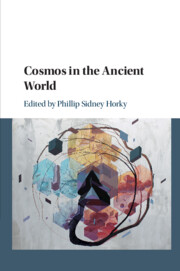Book contents
- Cosmos in the Ancient World
- Cosmos in the Ancient World
- Copyright page
- Dedication
- Epigraph
- Contents
- Contributors
- Acknowledgements
- An Historical Note on Kόσμος – Terminology
- Abbreviations
- Introduction
- Chapter 1 When Did Kosmos Become the Kosmos?
- Chapter 2 Ordering the Universe in Speech
- Chapter 3 Diakosmêsis
- Chapter 4 Aristotle on Kosmos and Kosmoi
- Chapter 5 Order and Orderliness
- Chapter 6 Polis as Kosmos in Plato’s Laws
- Chapter 7 Relating to the World, Encountering the Other
- Chapter 8 Tradition and Innovation in the Kosmos–Polis Analogy
- Chapter 9 Cosmic Choruses
- Chapter 10 All the World’s a Stage
- Chapter 11 The Architectural Representation of the Kosmos from Varro to Hadrian
- Chapter 12 “The Deep-Sticking Boundary Stone”
- Chapter 13 Cosmic Spiritualism among the Pythagoreans, Stoics, Jews and Early Christians
- Afterword
- Bibliography
- Index Locorum
- General Index
Chapter 10 - All the World’s a Stage
Contemplatio Mundi in Roman Theatre
Published online by Cambridge University Press: 18 June 2019
- Cosmos in the Ancient World
- Cosmos in the Ancient World
- Copyright page
- Dedication
- Epigraph
- Contents
- Contributors
- Acknowledgements
- An Historical Note on Kόσμος – Terminology
- Abbreviations
- Introduction
- Chapter 1 When Did Kosmos Become the Kosmos?
- Chapter 2 Ordering the Universe in Speech
- Chapter 3 Diakosmêsis
- Chapter 4 Aristotle on Kosmos and Kosmoi
- Chapter 5 Order and Orderliness
- Chapter 6 Polis as Kosmos in Plato’s Laws
- Chapter 7 Relating to the World, Encountering the Other
- Chapter 8 Tradition and Innovation in the Kosmos–Polis Analogy
- Chapter 9 Cosmic Choruses
- Chapter 10 All the World’s a Stage
- Chapter 11 The Architectural Representation of the Kosmos from Varro to Hadrian
- Chapter 12 “The Deep-Sticking Boundary Stone”
- Chapter 13 Cosmic Spiritualism among the Pythagoreans, Stoics, Jews and Early Christians
- Afterword
- Bibliography
- Index Locorum
- General Index
Summary
This chapter investigates the significance that Roman augural practice, as a kindred practice to Greek theôria, held for Roman comedy and tragedy. Central to its arguments are notions of time and space, which ultimately show the broad importance of Aristotelian concepts to the broader Hellenistic world. This piece argues that augury-taking involved sitting in a terrestrial temple while gazing at a specially demarcated zone of sky or a ‘whole-world’ (mundus). This temporarily legible space in which the gods would direct the signifying flight of birds was more than a celestial backdrop; it was also itself a temple (templum caeli), and the technical term for this temple-gazing was contemplatio. The institution of Roman theatre has not generally been associated with practices of auspication, but because of the emphatic insistence on the temporary stage, the conventional ‘unity of time’ and the probable placement of audience seating, there was a suggestive similarity between the Middle Republican audience’s spectation at tragedies and comedies and traditional augural contemplation. The structural echo between augural and theatrical contemplation outlives the Republican temporary stage in Seneca, where it has become a distinctively Roman mode of construing the intersection of the cosmic gaze and philosophical or spectatorial theôria.
Keywords
- Type
- Chapter
- Information
- Cosmos in the Ancient World , pp. 212 - 231Publisher: Cambridge University PressPrint publication year: 2019



